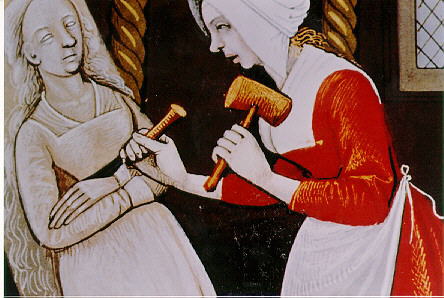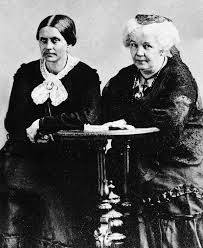Christian women: feminism is not your friend
Christian women (and men): please, let feminism go.
Better yet, let yourself go from it.
Release yourself from its shackles.
Everyday I hear from people who tell me they are ‘pro-life feminist’ or ‘Christian feminist.’ Yet millions of modern feminists would respond that such a thing is not possible. Feminism, they say, exists largely to combat the patriarchal evils of pro-life Christianity. They claim that calling yourself a pro-life feminist is like calling yourself a carnivorous vegan, or an environmentalist Humvee enthusiast. The concepts are contradictory, they argue, and I agree — though I’d say the term ‘pro-life feminist’ could be more aptly compared to ‘abolitionist slave trader’ or ‘free market communist.’
So I urge you: unbind yourself from the bondage of this term that’s become inexorably tied to a demonic dogma that obliterates the unity of the family, drives a wedge between a wife and her husband, and digs a giant chasm between a mother and her child.
Why put yourself on a spectrum that includes, to a large degree, somewhere – whether on one end or in the middle or in between or strewn throughout — a passionate belief in the inalienable right to murder the baby in your womb?
Why? What is accomplished? What truth did feminism reveal that will now be lost, or forgotten, should you stop ascribing to the label?
What truth did feminism reveal at all, actually?
That women are equal to men in human dignity and intrinsic value? No, feminism did not reveal this. Christianity revealed it. Christ revealed it. Christian thinkers throughout the ages have affirmed it and taught it; notably Thomas Aquinas, who said that women are meant to rule alongside men. That was 800 years ago, or 600 years before the term ‘feminist’ existed.
Here’s the part where I’m accused of being ignorant of feminist history.
I will admit that I haven’t taken any feminist studies courses, nor have I ever used the word ‘gendered,’ nor have I had any occasion to whip out femi-jargon like ‘phallogocentrism’ and ‘gynocriticism,’ but I have read a more comprehensive account of world history, so I do know this:
‘Feminism’ is derived from the French word ‘feminisme,’ and it was, from what I understand, first used by a French philosopher in the early-mid 19th Century. Adopted by ‘first wave feminists’ during the suffrage movement, the ‘reclaim feminism’ conservative Christian crowd now insists that it was coopted by radical man-haters in the 60′s.
They’re correct that the ‘tone’ of feminism has grown more — shall we say – unpleasant, but that doesn’t mean it was necessarily hijacked by ideological pirates. The point here is that feminists initially fought for goals like voting rights and property rights (among other things, which we’ll get to later). Now, no woman is barred from voting or owning property based on her gender. So the mission has evolved, and evolved into something far less noble.
And we arrive at the real problem:
Feminism is no longer a matter of fighting for equal rights. Feminism has turned in on itself and become an effort to redefine what constitutes a ‘right’ and what constitutes ‘equality.’
We live in a society where unborn humans are the only group consistently and seriously deprived of basic legal protections. Incidentally, feminists — liberal feminists, modern feminists, feminist feminists, whatever you want to call them — are the ones primarily responsible for codifying this injustice into law. The only true ‘equal rights’ movement left in America is the pro-life movement, and guess who the pro-lifers are fighting against?
Feminists. They might be ‘new wave feminist’ or ‘third wave feminists’ or ’12th ripple of the third wave redesigned neo-feminists 2.0,’ but they’re feminists, one way or another.
This is a pretty convincing indication that feminism has, at the very least, outlived its good. There is nothing surprising about that, because feminism, unlike Christianity, is a human construct. It’s an ideology. It’s a political theory. It’s a label. It is not eternal, it is not perfect (there’s the understatement of the decade), and it is not indispensable.
Feminism, like ‘liberalism,’ like ‘conservativism,’ like the Republican Party, like the Democrat Party, is a finite thing that exists and serves a certain purpose in a certain set of circumstances. When the times change, and the circumstances change, it will either die or its purpose will change.
Think of political labels like seatbelts. A seatbelt is a good thing, assuming you’re in a car and the car is moving. But if you’re underwater, or the car is on fire, suddenly the seatbelt is less a safety mechanism and more a deathtrap. So it’s not enough to say that ‘seatbelts are good.’ What you mean is ‘safety is good, and seatbelts sometimes make us safer.’ Similarly, equal legal protections are good, and feminism, at one point many years ago, helped ensure those legal protections. Times have changes, and feminism no longer serves that purpose.
This car is our culture, and feminism is the seatbelt that melted and trapped you inside this blazing inferno.
It should also be noted that the problems with feminism stretch far beyond abortion. It seems, for instance, that even many conservative feminists subscribe to the notion that women were subjugated and oppressed for the entirety of human civilization, until the emergence of the feminist movement.
They tie female liberation to the Industrial Age, equating the liberty of womanhood with her ability and opportunity to work a job and participate in the American democratic system. Lost in this theory is the fact that Christian civilization — before the United States, before industrialization, even before Gloria Steinem — afforded many rights to women. How often do you hear anyone mention that females were members in equal standing to men in the vast majority of the English Guilds in the Middle Ages?
Yes, thanks to Christianity, there were women in many occupations and practicing many trades, long before we were all seduced by the siren song of the assembly line.
Feminism, at its roots, has also struggled to differentiate between equality of rights and equality of being. We all deserve equality under the law, but that doesn’t mean we are all equal.
Equality: sameness.
To be equal is to be the same. Women are not equal to men because they are not the same as men. Therefore, a woman’s freedom is really slavery if it forces her to abandon all of the unique feminine abilities and characteristics that make her a woman. The same could be said for men, if his freedom requires him to shirk that which sets him apart from women and makes him a man.
From my reading of the history of feminist theory, it would seem that feminism has always embraced a sort of Platonic idea that our bodies are mere shells for our souls, and so our gender differences are just mechanical.
Christianity, on the other hand, has from the beginning taught that our bodies are in union with our souls, and our physiological differences run much deeper than flesh and bone.
I’m venturing way off into the weeds here, and I don’t want the point to get lost in an academic discussion. Whatever feminism was, we have to deal with what it is.
And what is it?
First, it’s the single loudest voice in favor of slaughtering innocent children.
Do I need to proceed to a second point?
Go ahead and tell me that the pro-abortion feminists are but members of a ‘spectrum.’ The question is whether you want to include yourself on a spectrum that ends, on one side, in the blood of infants.
Here’s an interesting question: if, in order to erase abortion, we had to erase all of the other things that feminism accomplished, would you erase it? Would you flip that switch? In this outlandish hypothetical, would you obliterate feminism to end abortion, if it meant obliterating whatever else feminism has achieved?
I hope that you would. I would if I was you. If all the works of feminism had to be turned back just to undo what it’s done in the last 40 years, I’d do it.
This is all a long way of asking: does the good of feminism outweigh the evil of it?
I say no. An emphatic, unflinching no.
It’s not even close, in fact.
And, beyond that, what does it say about feminism that it so quickly turned into this monstrosity? It might be time for pro-life feminists to confront the possibility that pro-abortion feminism is not some kind of extreme perversion of first wave feminism. It might be time to consider the chance that, though many of the pioneer feminists did not advocate abortion, and may have even stridently opposed it, they still developed the theories and ideas that would later be used (and used logically) to fuel the pro-choice movement.
Feminism, from the very beginning, at its earliest stages, had a habit of presenting the family and religion as enemies to female equality. Elizabeth Stanton, friend of Susan B. Anthony, and one of the godmothers of feminism, said that “the bible and the church have been the greatest stumbling block in the way of women’s liberation.” This was a woman of the first wave — not the second, not the third. This is Scripture made out to be an obstacle, a ‘stumbling block,’ way down at the very foundation of feminist theory.
Meanwhile, Susan B. Anthony’s newsletter “The Revolution” had this motto: “The True Republic – Men, their rights and nothing more; Women, their rights and nothing less.”
From the very beginning, at its earliest stages, feminism was a movement designed to find equality with men — and then dominance over them. Christianity has always taught harmony and love between the sexes, while feminism preaches competition and exclusion. There is simply no way to reconcile feminism with Biblical notions of marriage, and even the early feminists knew it.
I’m no Susan B. Anthony biographer, but even I recognize this famous quote from the first lady of feminism:
“There is not the woman born who desires to eat the bread of dependence, no matter whether it be from the hand of father, husband, or brother; for any one who does so eat her bread places herself in the power of the person from whom she takes it.”
Casting ‘dependence’ as the ultimate evil, characterizing the family and marriage as a power struggle — this goes to the very heart of feminist thought. To deny that is to deny reality.
But why argue over this? If you believe that women should have equal protection under the law — good. I agree with you. Almost everybody agrees with you. That belief just makes you a constitutionalist.
If you believe that women possess an equal inherent worth and dignity — great. I agree with you. That belief either makes you Christian, or brings you closer to becoming one.
All of the ground is covered, there is no need for feminism. Whatever good could be found, it’s now covered in piles of death and hatred, and no matter what anyone wants to believe, the roots of ‘bad feminism’ can be traced back to ‘good feminism.’ Saying that you need to cling to feminism just because you believe in equal protection under the law is like saying you have to be a Klan member just to be a states rights proponent (the KKK has had its own ‘waves,’ and its earliest members were essentially guerillas fighting against northern occupation of southern states).
So there is no need for it, unless you wish to tinker with the definitions of ‘equal protection’ and ‘inherent worth and dignity,’ so as to justify things like abortion-on-demand and taxpayer subsidized birth control.
For that, you need feminism, and for that, you don’t need Christianity.
I think it’s time to choose between the two.




No comments:
Post a Comment